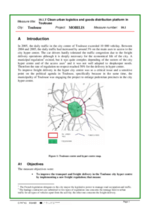Developing clean urban logistics
Summary
Improving freight delivery services in Toulouse was identified as a way of overcoming the city’s increasing congestion problems.
Implementing sustainable mobility
At the time of measure implementation, improving freight delivery in the city centre had become a critical issue for Toulouse, especially in connection with the expansion of the city’s pedestrian zones. Daily traffic in Toulouse city centre was then exceeding 10,000 vehicles per day and had risen by around 3 percent in one year on the main access routes to the centre of the city. Car drivers were highly intolerant of traffic congestion caused by freight delivery operations. A municipal freight delivery regulation existed, but it was quite complex and did not meet the needs of traders in the city centre. As a result, around half of the deliveries to the city centre were not made in compliance with the regulation.
The two objectives were to:
- improve transport and freight delivery in the centre of Toulouse by implementing a new freight regulation; and
- prepare for the development of a logistics platform, or urban delivery centre (UDC) at conurbation level through the implementation and evaluation of a new delivery system led by the mail and parcel delivery company Chronopost.
Progress
The Toulouse Department of Transport first studied the freight delivery regulations in other cities and the experiences of urban delivery centres at European level, analyzing the positive features and barriers and drawing up recommendations for implementation in Toulouse.
In January 2006, a steering group presented the urban delivery centre concept to different road hauliers and discussed the proposals for a new freight delivery regulation that favoured smaller, cleaner vehicles. The smaller haulage companies opposed the creation of a common urban delivery centre located in the suburbs, on the grounds that this structure would favour big haulage firms. They accepted the need to renew the regulation, but only in agreement with shopkeepers.
Between January and March 2006, city representatives, together with shopkeepers and road hauliers, defined the new freight delivery regulation and the location of dedicated delivery areas in the city centre.
The city of Toulouse abandoned the project of creating an urban delivery centre in June 2007, due to opposition from many road haulage companies.
In parallel, Chronopost made efforts to present itself as an environmentally friendly company by modifying its delivery operations, previously carried out by six diesel lorries, between its logistics platform near the airport and six areas in the city centre. The city council was interested in this trial and its evaluation as a way of proving to other haulage companies the benefits of more environmentally friendly freight delivery in the city centre. The city of Toulouse made premises in the city centre available to Chronopost. Using them as a micro delivery platform, Chronopost launched morning rounds to the six central areas by three electrical vehicles, one CNG vehicle and two Chronocity vehicles, which are electrically self-propelled and steered by a walking delivery person. A CNG vehicle undertakes an additional round, if necessary, for large parcels. Only the three electrical vehicles and the CNG vehicle are used for the afternoon rounds.
Outcomes
The new delivery regulation, implemented with the agreement of road hauliers and shopkeepers, limited the tonnage for goods delivery lorries and the delivery time period during the day in the city centre. Discussions between the city, the haulage companies and the shopkeepers representative led to the drawing up of a freight delivery quality charter to define and implement controlled freight delivery areas. In addition, the new parking management regulation and the redesigning of public space in the city centre helped to free up access to the delivery parking area. Shopkeepers accepted the slight constraints imposed by this new regulation.
The analysis of the Chronopost mail delivery platform was positive with respect to environmental, economic and social aspects. The cost of the new operations is quite similar to that of the previous system, while in terms of environmental impact, there was a reduction of 58 percent in emissions of carbon dioxide, representing savings of 15 tons a year. The new delivery system was relatively transparent for Chronopost customers, who seemed to appreciate the environmental protection benefits connected to the use of cleaner vehicles. The delivery staff appreciated the clean vehicles and working from the new platform in the city centre. Support from the city of Toulouse for the creation of the Chronopost platform in the city centre, where commercial property is quite rare, was a highly positive aspect of the measure.
Despite ending in failure, the urban delivery centre project made it possible, for the first time in Toulouse, to initiate a consultation between road haulage companies and city representatives towards a global approach to freight delivery in the city centre and its dissemination towards professionals in favour of clean vehicles.








